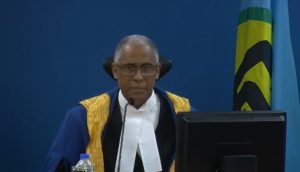Caribbean Court says Granger’s gov’t in “caretaker” mode, elections must be determined locally
The Caribbean Court of Justice (CCJ) on Friday ruled that it is for Guyana’s President, Opposition Leader, Parliament and the Guyana Elections Commission (GECOM) to determine when General Elections should be held.
On the appointment of a GECOM chair, the CCJ urged that, as a matter of the greatest public importance, “the President and the Leader of the Opposition should, as soon as possible, embark upon and conclude the process of appointing a new GECOM Chairman.” Since the Court’s decision, the Chairman of GECOM, Retired Justice James Patterson voluntarily submitted his resignation.
Regarding the consolidated matters concerning the no-confidence motion, the CCJ noted that there is clear guidance in Article 106 of Guyana’s Constitution on what should happen next. The Court stated, “upon the passage of a vote of no confidence, the Article requires the resignation of the Cabinet including the President. The Article goes on to state, among other things, that notwithstanding its defeat, the Government shall remain in office and that an election shall be held “within three months, or such longer period as the National Assembly shall by resolution supported by not less than two-thirds of the votes of all the elected members of the National Assembly determine”.
The Court noted that the filing of the court proceedings in January, challenging the validity of the no-confidence vote, effectively placed matters on pause. The Court reminded, however, that it had rendered its decision on 18 June, 2019. As to the precise orders it should make, the CCJ cautioned, however, that it is not, “the role of the Court to establish a date on, or by which, the elections must be held”. Article 106 is clear and it should be followed, the CCJ stated. The CCJ did express the view that it is expected that the Government will continue as a caretaker for the affairs of the country but that in light of its caretaker role it should be restrained in the use of its legal authority.
In the matter concerning the GECOM chairperson, the CCJ noted that since the Chairman in question had already demitted office, it was unnecessary to issue any orders on this point. However, it was the Court’s view that the appointment process of a new Chairman should be embarked upon with “the utmost urgency” in light of the CCJ’s decision in the no-confidence motion cases which has triggered the need for fresh general elections.



